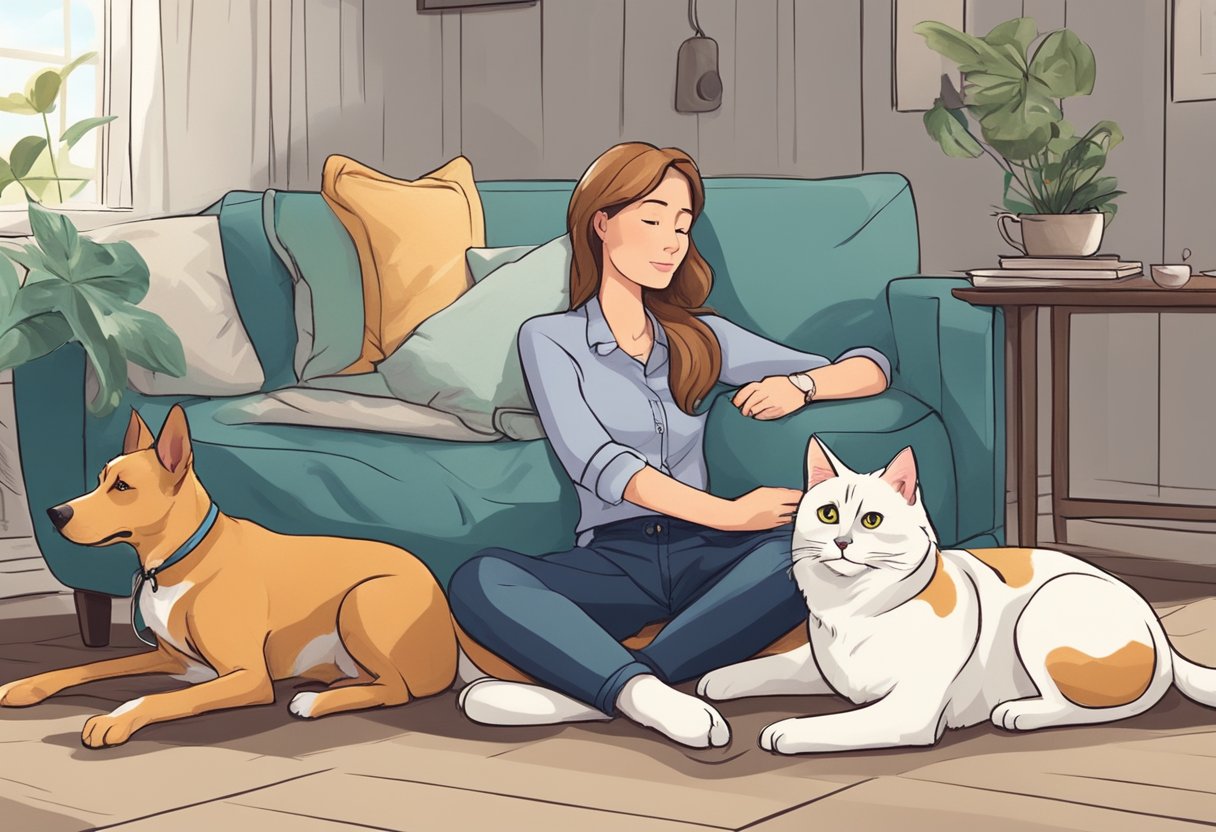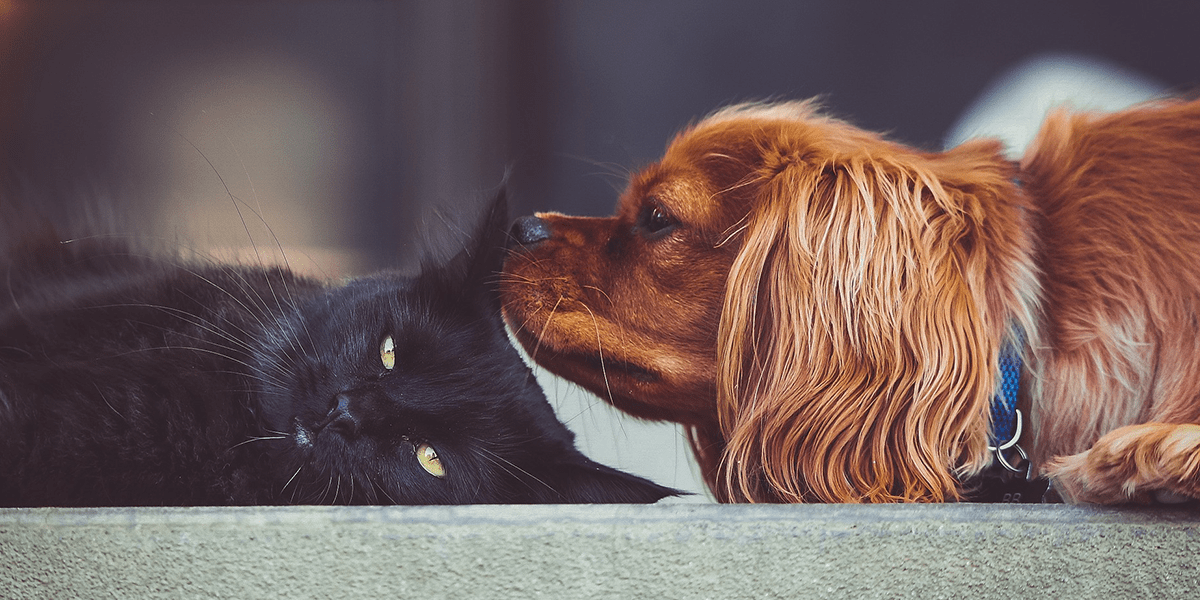Cats and dogs have long been known for their ability to sense when something is wrong with their owners. This phenomenon has been observed in countless anecdotes and case studies, leaving many pet owners wondering how their furry friends seem to know what’s going on before they do.
While the exact mechanisms behind this ability are not yet fully understood, researchers have made significant strides in recent years towards unlocking the secrets of animal senses.

Understanding animal senses is critical to understanding how cats and dogs can detect changes in their owner’s health or emotional state.
Cats, for instance, have a highly developed sense of smell that allows them to pick up on subtle changes in body odour that may indicate illness or stress.
On the other hand, dogs have a keen sense of Hearing and can often detect changes in their owner’s tone of voice or breathing patterns that may indicate a health issue.
By tapping into these powerful senses, cats and dogs can form a deep emotional connection with their owners and respond to their needs remarkably.
Key Takeaways
- Cats and dogs have highly developed senses that allow them to detect changes in their owner’s health or emotional state.
- By tapping into these powerful senses, cats and dogs can form a deep emotional connection with their owners.
- While the exact mechanisms behind this ability are not yet fully understood, researchers have made significant strides in recent years towards unlocking the secrets of animal senses.
Understanding Animal Senses
Cats and dogs have different sensory abilities that allow them to sense something wrong with their owner. Understanding their senses can help us understand how they react to certain situations.
Sense of Smell
Cats and dogs have an incredible sense of smell, which is much more potent than humans. They can detect scents that are not detectable to humans, and they use this ability to recognise their owners. They can also see changes in their owner’s scent, such as those caused by stress or illness.
Hearing
Cats and dogs have a highly developed sense of Hearing, which allows them to hear sounds that are inaudible to humans. They can listen to sounds from long distances and can detect changes in their owner’s tone of voice, which can indicate their owner’s emotional state.
Vision
Cats and dogs have different visual abilities. Cats have excellent night vision, while dogs have better colour vision than cats. Both animals can detect movement and changes in their environment, which can help them sense when something is wrong with their owner.
Touch
Cats and dogs have a highly developed sense of touch. They use their whiskers to detect environmental changes and feel vibrations through their paws. They also use touch to communicate with their owners and to comfort them when they are upset.
360-Degree Hearing
Cats have a unique ability to hear sounds from all directions, known as 360-degree Hearing. This allows them to detect sounds not in their direct line of sight, which can help them sense when something is wrong with their owner.
In conclusion, cats and dogs have different sensory abilities that allow them to sense something wrong with their owner. Understanding their senses can help us understand how they react to certain situations and can help us provide the best care for our furry friends.
Cats and Their Sensory Perception
Cats have a highly developed sensory system that allows them to perceive their surroundings uniquely. Their sense of smell is particularly acute, with the ability to detect undetectable scents in humans. Cats have fourteen times more olfactory receptors than humans, making them highly sensitive to smells.
Cats also have an incredible sense of touch, which their whiskers facilitate. These specialised hairs are connected to nerve cells that allow cats to detect the slightest movement or vibration in their environment.
Additionally, cats have excellent night vision, thanks to the structure of their eyes and the presence of a reflective layer called the tapetum lucidum.
While cats have a relatively poor sense of taste, they make up for it with their susceptible paw pads. These pads contain numerous sensory receptors that allow cats to feel the texture and temperature of surfaces they walk on, as well as detect vibrations in the ground.
Cats are also highly attuned to danger and can sense something wrong with their owner. This ability is partly due to their enhanced sense of smell, acute Hearing and vision. When a cat senses danger, they may become agitated, hiss, or arch their back to appear larger and more intimidating.
Overall, cats have a remarkable sensory system that allows them to navigate their environment and detect potential threats easily. Their heightened sense of smell, touch, and vision and ability to sense danger make them excellent companions and protectors.
Dogs and Their Sensory Perception
Dogs are known for their incredible sensory perception, which allows them to sense when something is wrong with their owner.
Their sense of smell is awe-inspiring, as they have up to 300 million olfactory receptors compared to humans, who have only 6 million. This enhanced sense of smell allows them to detect changes in their owner’s body chemistry, such as increased adrenaline levels when feeling anxious or stressed.
In addition to their sense of smell, dogs also have 360-degree Hearing, which enables them to pick up on sounds that humans may not even notice. This means they can hear things from a distance and sense danger before their owner does.
Their acute Hearing also allows them to pick up on changes in their owner’s tone of voice, which can indicate that something is wrong.
Canines are also highly attuned to their owner’s body language and behaviour. They can pick up on subtle changes in their owner’s posture and movements, indicating something is wrong. For example, if their owner feels unwell, they may move more slowly or appear more lethargic than usual, which a dog may pick up on.
Overall, dogs have a range of sensory abilities that allow them to sense when something is wrong with their owner.
Their enhanced sense of smell and 360-degree Hearing, along with their ability to pick up on changes in body language and behaviour, make them incredibly perceptive animals that can provide comfort and support to their owners in times of need.
How Animals Sense Their Owner’s Health
Cats and dogs have an incredible ability to sense when something is wrong with their owners. They can detect changes in their owner’s behaviour, facial expressions, and blood pressure. But how do they do it?
Research has shown that animals can pick up on subtle changes in their owner’s scent, indicating illness or disease. They can also detect changes in their owner’s behaviour and body language, which can signify sickness or distress.
Animals can also sense changes in their owner’s energy levels. Pets can sense when an owner is ill or dying because of a drop in energy levels. Animals often become more protective and affectionate when their owners are sick or dying.
In addition, cats and dogs have been known to detect certain illnesses, such as cancers and diabetes, through their sense of smell. They can also pick up on behavioural changes that may indicate depression or other mental health issues.
Overall, cats and dogs have an incredible ability to sense when something is wrong with their owners. While the exact mechanisms behind this ability are still not fully understood, it is clear that animals have a unique way of detecting illness and disease in their human companions.
Animal Behaviour and Emotional Connection with Owners
Cats and dogs are known for their ability to sense when something is wrong with their owners. This is due to their heightened senses and emotional connection with their human companions.
Behaviour plays a significant role in how animals respond to their owners’ emotions. For example, a dog may become anxious or agitated if their owner is stressed or upset. Similarly, cats may display signs of fear or anxiety if they sense negative energy or bad vibes from their owner.
Body language is another crucial factor in how animals respond to their owners’ emotions. Dogs may wag their tails or lick their owners’ faces to show affection and comfort, while cats may purr or rub against their owners to show their love and support.
Emotions also play a crucial role in how animals respond to their owners. Dogs and cats have been known to sense their owners’ sadness and provide comfort and support during difficult times. They may also become fearful or anxious if their owners are experiencing negative emotions.
The emotional connection between animals and their owners is a powerful bond that can have a significant impact on both parties. Animals can provide comfort, support, and love to their owners while helping alleviate stress and anxiety.
In conclusion, cats and dogs have a unique ability to sense when something is wrong with their owners. This is due to their heightened senses, emotional connection, and ability to read their owners’ body language and emotions. By understanding and nurturing this bond, owners can strengthen their relationship with their furry companions and provide them with the love and support they need.
Animals and Their Sixth Sense
Cats and dogs are known for their ability to sense when something is wrong with their owners. This sixth sense is often attributed to their instincts and intuition.
Instincts are inherent traits that animals possess which allow them to respond to certain situations without any prior experience. For example, a cat’s instinct to climb trees or a dog’s instinct to bark at strangers. These instincts are deeply ingrained in their genetic makeup and essential for survival.
Intuition, however, is the ability to understand something without conscious reasoning. It is often described as a gut feeling or a hunch. Animals, including cats and dogs, possess this ability, which allows them to sense danger or distress in their owners.
Psychic abilities or sensory perception are often associated with animals’ sixth sense. While there is no scientific evidence to support these claims, many pet owners believe that their animals possess these abilities.
Overall, cats and dogs possess a unique ability to sense when something is wrong with their owners. This ability is attributed to their instincts, intuition, and sensory perception. While the exact mechanisms behind this sixth sense are not fully understood, it is clear that it plays an essential role in the bond between pets and their owners.
Animals Sensing Natural Disasters
Cats and dogs possess remarkable skills in detecting impending natural disasters through their acute senses. They often exhibit restless, anxious, or even aggressive behaviour in response to changes in air pressure, ground vibrations, and wind direction. Such behaviours, particularly noticeable before storms and earthquakes, indicate their sensitivity to environmental shifts. This instinct of pets can serve as a crucial alert system, aiding disaster preparedness.
Case Studies and Anecdotal Evidence

Numerous stories and studies, including a notable one in Japan, demonstrate cats’ and dogs’ ability to sense their owners’ distress or health issues. Dogs, for instance, have shown an 86% accuracy rate in detecting seizures in their owners, as per Akiko Takaoka’s study.
Trained therapy dogs can often perceive stress or anxiety in their owners, providing comfort and support. Similarly, cats have been known to alert owners to intruders or health problems. Beyond this, pets exhibit unique skills like hunting in cats or water detection in dogs, which is helpful in search and rescue. This intriguing ability of pets to sense owner distress continues to be a subject of study and fascination.
Conclusion

In conclusion, cats and dogs have an incredible ability to sense when something is wrong with their owner. They can pick up on subtle changes in body language, scent, and behaviour, which allows them to detect illness, stress, anxiety, and other emotional and physical issues.
While the exact mechanisms behind this ability are not fully understood, it is believed that cats and dogs have a highly developed sense of smell and an acute awareness of their surroundings. They are also highly attuned to their owner’s emotions and can pick up on changes in mood and behaviour.
Pet owners must know their pet’s behaviour and note if they seem to be acting differently. This can indicate that something is wrong with the owner, and they should seek medical attention if necessary.
Overall, the bond between pets and their owners is extraordinary, and the ability of cats and dogs to sense when something is wrong is just one of the many ways they enrich our lives.
Frequently Asked Questions
How do cats and dogs sense changes in their owner’s behaviour?
Cats and dogs are susceptible to environmental changes, including changes in their owner’s behaviour. They can pick up on subtle differences in body language, tone of voice, and even scent. For example, if their owner is feeling anxious or stressed, cats and dogs may become more alert and attentive to their owner’s needs.
Can cats and dogs detect illness in humans?
While there is no scientific evidence to support the claim that cats and dogs can detect illness in humans, many pet owners report that their pets seem to know when they are feeling unwell. Some studies have suggested that dogs may be able to detect certain types of cancer by smelling changes in a person’s breath or body odour.
What signs do cats and dogs exhibit when sensing something is wrong with their owner?
Cats and dogs may exhibit various behaviours when they sense something is wrong with their owner. These behaviours may include increased attention and affection, vocalisation, pacing, and even physical contact, such as nudging or licking.
Can cats and dogs sense impending danger?
It is believed that cats and dogs may sense impending danger, such as an earthquake or storm, due to their keen sense of hearing and ability to detect changes in air pressure.
How do cats and dogs use their senses to detect changes in their owner’s health?
Cats and dogs use their senses, including their sense of smell and hearing, to detect changes in their owner’s health. For example, dogs have been trained to detect changes in blood sugar levels in people with diabetes by smelling their breath or sweat.
Can cats and dogs detect emotional distress in their owners?
Cats and dogs are highly attuned to their owner’s emotional state and may be able to detect emotional distress through changes in body language, tone of voice, and behaviour. They may offer comfort and support to their owner during stress or anxiety.








